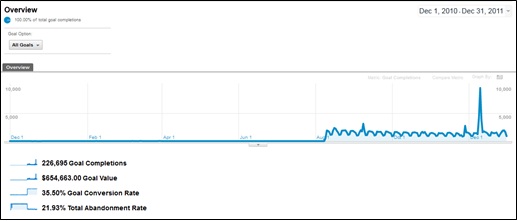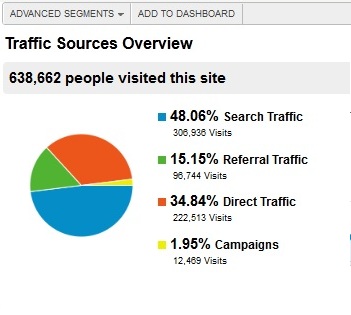Today, tools like Google Analytics make accessing any kind of data about your website seamless. With the ability to produce reports, segment the data, view real time traffic reports and run custom report filters it can be quite challenging to know where to focus.
In this post, I decided to outline 3 metrics each Google Analytics user should use to make better marketing decisions. These metrics will help users refine their marketing strategy and improve their website.
1. Site Search
Generally speaking, most people who use Google Analytics can quite easily say what keywords people use to find their sites. But what about the keywords people use to search your site? Each website that gets any kind of traffic should have a site search. It helps website visitors navigate your website, and it helps you analyze what content website visitors are searching for. The easiest way to add site search to your site is by utilizing Google Site Search. It is easy to use and very affordable ($100 annually for the websites with 20,000 search queries limit).
Once you add site search to your site, you can start tracking queries, and track what people are searching for when they land on your site. This will help you identify the search terms visitors use and how your visitors engage with the website after the search. If you see that your users are constantly searching for the same service/feature, it means that you need to make some changes to your menu or to your home page to make this keyword more evident. You will also be able to track where the searches begin and end. These items are crucial for improving website usability and driving conversion rates.
2. Performance Goals
Each site has business objectives. One of the business objectives of my site is to get a certain number of qualified leads each month. Another objective for my site is to get people to register for free events. Establishing and measuring these objectives is a sure way to know how well your website performs.A goal conversion takes place when a certain action is taking place on a site related to your business objectives – transaction is completed, form is submitted, newsletter list is joined. Properly tracking goals will help you geo target your campaigns, refine your website keywords and create your buyer personas, among other things.
3. Ratio Between Direct, Referral and Search Traffic
Each website gets three types of traffic. Direct – visitors that get to the website by typing the website URL into the address bar. Referral – visitors that arrive from other sites like Facebook. Search – visitors that find your website by searching for information on Google or Bing.
The important thing is to maintain a balance, and use all three channels to drive traffic. A lot of organizations see search engines as their number one source of traffic. This is great, and it means that the SEO campaign is working. However, what would happen if Google changed their search algorithm, and the traffic suddenly dropped? Do not put all of your eggs in one basket.
There is no one good formula that fits all. 30%/35%/35% formula will not always work. Look at the historic data, and see which channel has traditionally underperformed? Perhaps, referring traffic has been less than 10% over the past two years. There is your opportunity for improvement.
Summary
Google Analytics can offer you a lot of useful information, but more is not always better. Every time you look at data, I would recommend asking yourself two simple questions:
-
- So what?
-
- Who gives a #$%^?
If you are able to answer these questions, then the data is worth examining. If not, do not waste your time.






